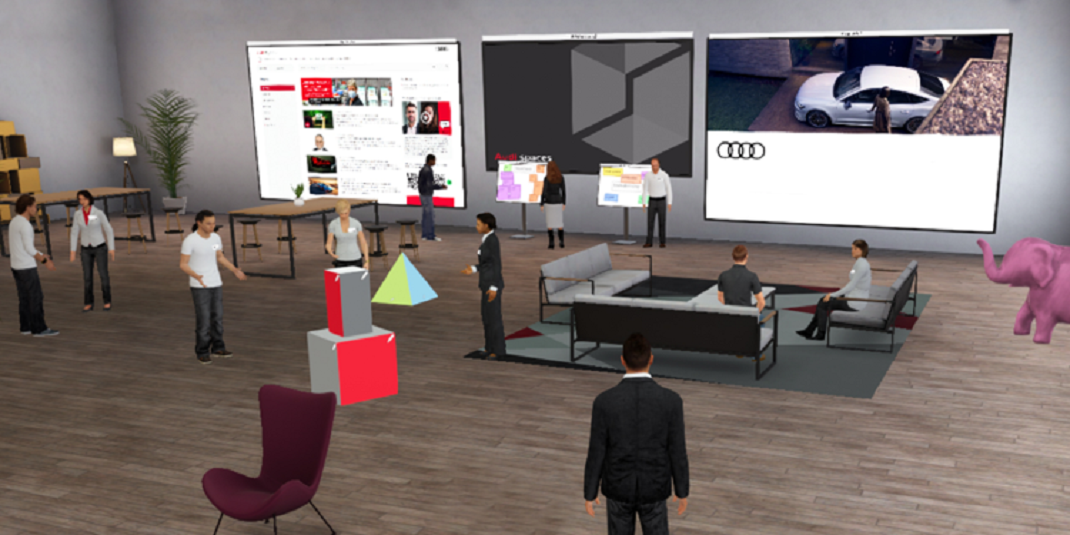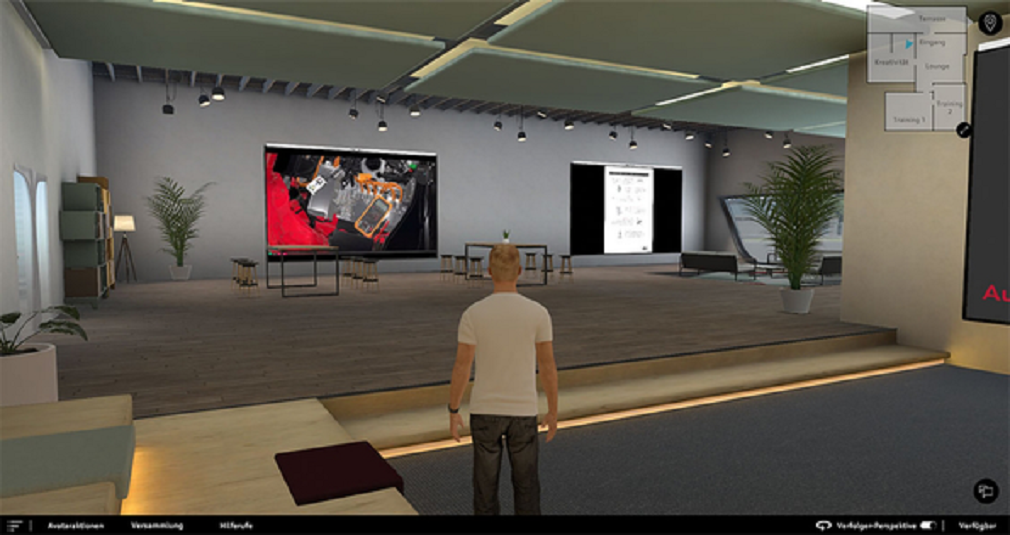|
During the corona pandemic, everyone is talking about the home office. With “Audi spaces”, Audi has developed and introduced a virtual 3D world for learning and work. Audi employees can use this digital tool from their computers – in hugely varied ways: as a tool for learning and training, as a means of coaching and consulting, and for digital collaboration and communication.
Whether Skype, MS Teams or other digital tools – at present, virtual services are more vital than ever, in order to stay in touch during the pandemic. However, it is often the case that this happens at the expense of social interaction: meetings can easily seem impersonal, and participants’ levels of concentration decline over time.
With Audi spaces, the Audi Akademie is now launching new software that takes this very issue as its starting point and offers a solution: the interactive 3D worlds in Audi spaces are copies of the real working environment, creating many possibilities for media and social interaction.
Using the opportunities of digitalization, pushing ahead the digital transformation
The participants communicate, learn and work with others via their own avatar – in real-time and in a virtual space. The avatars in Audi spaces are not mere “empty vessels”: they can make gestures, interact, and talk to one another as in the real world. Sabine Maassen, Audi Board Member for Human Resources, says, “With Audi spaces, we are using the opportunities presented by digitalization and providing employees with a tool that supports them in a world of work that is highly dynamic and is becoming more and more complex.
The tool enhances the collaboration of teams across the boundaries of departments and countries. In this way, we are making a contribution to the digital transformation of Audi.”
Audi spaces is suitable for many applications, as it can be used for diverse groups independently of the topic. Participants describe it as more relaxed and less tiring than video conferences when they can make arrangements to meet colleagues in a space and interact together. In this way, Audi spaces can contribute to reinforcing the feeling of community – even for cooperation in an international context: the tool is available for all employees worldwide.
Audi spaces thus open up new opportunities for training Audi employees: it enables not only meetings but also conceptually and methodically planned training courses from the Audi Akademie. With the continually growing functional scope of the tool, learning and training scenarios, workshops, coaching sessions, and also consultations can be carried out in a way close to reality.
Complex processes and work situations that can otherwise only be represented with much effort, or can only be practiced with potential threats to safety at work, can be trained in Audi spaces as often as desired while saving costs and resources. For example, with Audi spaces, Audi employees have the opportunity to learn, virtually and as often as they please, the decommissioning of e-vehicles in a self-teaching scenario. In doing so they can even simulate errors without any danger to their health occurring.
More than 4,000 Audi employees are already using Audi spaces in approximately 200 events per month
For the purpose of exploiting the potential of Audi spaces to the full, the Audi Akademie offers employees, in cooperation with their Audi IT, comprehensive support and advice plan, and various qualification modules. These explain not only the functions of Audi spaces but also prepare consultants and trainers in didactic methods to develop conceptually advanced measures using the tool.
“Thanks to its integration into our existing IT and media landscape, Audi spaces can be used by all employees worldwide and also by external partners and can be extended for new target groups in the long term. We, the project team, are delighted that the tool has become more and more popular since its roll-out and that new application scenario are added every day.
More than 4,000 Audi employees now take advantage of the new possibilities for virtual collaboration in some 200 events per month. By doing so, they also contribute to the further development of the tool,” explains Patrick Zöbisch, project manager for Audi spaces.
|
 Audi employees come together in a 3D world of learning and work
Audi employees come together in a 3D world of learning and work

































